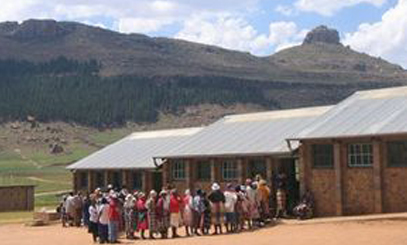All Basotho Convention (ABC) leader Tom Thabane said late Tuesday that at least five parties would form an alliance giving them a minimum of 64 seats, a majority in the 120-seat parliament.
“We have a common goal of seeing a Lesotho that is truly democratic and since none of our parties have the numbers we decided to form a coalition,” Thabane said.
Final results from Saturday’s election showed Mosisili’s Democratic Congress (DC) winning 48 seats, of which 41 are directly elected and seven awarded by a proportional representation system.
Saturday’s vote was the most closely watched in 14 years when Mosisili’s election sparked violent protests that left 100 people dead and led to a regional military intervention led by South Africa.
As the biggest party, the Democratic Congress has the first right to try to form a coalition to govern the tiny mountain kingdom which is entirely surrounded by South Africa.
However, this now appears unlikely given the opposition move.
A Gallup poll last month ranked Mosisili among Africa’s five most despised leaders, with only 39 percent approving of his job performance, placing him alongside the likes of Zimbabwe’s Robert Mugabe.
Mosisili, 67, had said during the election campaign he would hand over power if he lost.
Under the coalition deal, the Lesotho Congress for Democracy (LCD) will add its 26 seats to the ABC’s 30 while the smaller Basotho National Party, the Popular Fund for Democracy, and the Marematlou Freedom Party will also join up.
Leaders of all five parties were present at the announcement, where they said the coalition structure would be discussed at a later stage.
“We are not concerned with that at the moment. The first step was to agree to a coalition and as talks go on legalities on who does what will be sorted out,” said Thabane.
Under the constitutional monarchy’s mixed election system voters elect lawmakers to represent 80 constituencies. Another 40 seats in parliament are awarded under a proportional vote system.
Mosisili campaigned on Lesotho’s relative stability on his watch, which ended a long dictatorship and a rocky period of monarchy.
He came to power as head of the LCD in a 1998 electionn, but broke away and founded the Democratic Congress in March this year after a fallout with other party leaders when he wanted to appoint a successor unilaterally.
Personal feuds among the three main party leaders — all of whom were once members of the LCD — have largely overshadowed polls in a country where more than half of its two million people live in poverty.
Thabane broke away to form his own party in 2006 after a feud with Mosisili, while LCD leader Mothejoa Metsing opposed Mosisili’s moves earlier this year to appoint a successor which led to the prime minister leaving the party.
Thabane’s Basotho Convention performed strongly in the cities, reflecting dissatisfaction among urban voters with the prime minister, but Mosisili regained dominance through strong rural support, which made up two-thirds of his party’s constituencies.










































